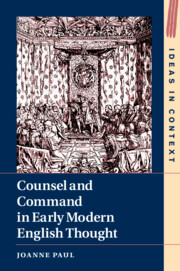Book contents
- Counsel and Command in Early Modern English Thought
- Ideas in Context
- Counsel and Command in Early Modern English Thought
- Copyright page
- Contents
- Acknowledgements
- Introduction
- Part I
- Part II
- Chapter 3 Machiavellian Counsel
- Chapter 4 Political Prudence
- Chapter 5 Late Tudor Counsellors
- Part III
- Bibliography
- Index
- Ideas in Context
Chapter 4 - Political Prudence
from Part II
Published online by Cambridge University Press: 18 February 2020
- Counsel and Command in Early Modern English Thought
- Ideas in Context
- Counsel and Command in Early Modern English Thought
- Copyright page
- Contents
- Acknowledgements
- Introduction
- Part I
- Part II
- Chapter 3 Machiavellian Counsel
- Chapter 4 Political Prudence
- Chapter 5 Late Tudor Counsellors
- Part III
- Bibliography
- Index
- Ideas in Context
Summary
In the Machiavellian literature on counsel, the distinction between private and public prudence becomes more pointed, leading to a distinction between a private sphere ruled by morality, and a public sphere in which moral flexibility, or even amoralism, is appropriate. As Machiavellian principles spread, such a view became accepted even amongst self-described anti-Machiavellians, especially in considering ‘policy’ and political deliberation. Counsellors must weigh both private and public expectations, offering advice that takes into account necessity and advantage politically but with an awareness of traditional expectations, embracing the skill of redescription when occasion, still in the tradition of kairos, calls for the employment of vice. Not only does this redefinition of prudence establish a separate sphere of morality (or lack thereof) for politics, it also introduces a language of contingency and exceptionalism, which becomes associated with the counsellor. In contrast with earlier writings on the topic, in this tradition the counsellor must mitigate not the tyranny of the prince, but of fortune.
- Type
- Chapter
- Information
- Counsel and Command in Early Modern English Thought , pp. 97 - 121Publisher: Cambridge University PressPrint publication year: 2020

